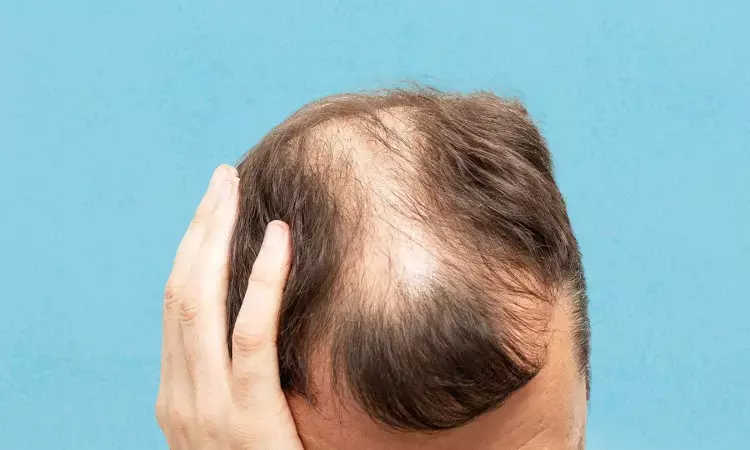- Home
- Medical news & Guidelines
- Anesthesiology
- Cardiology and CTVS
- Critical Care
- Dentistry
- Dermatology
- Diabetes and Endocrinology
- ENT
- Gastroenterology
- Medicine
- Nephrology
- Neurology
- Obstretics-Gynaecology
- Oncology
- Ophthalmology
- Orthopaedics
- Pediatrics-Neonatology
- Psychiatry
- Pulmonology
- Radiology
- Surgery
- Urology
- Laboratory Medicine
- Diet
- Nursing
- Paramedical
- Physiotherapy
- Health news
- Fact Check
- Bone Health Fact Check
- Brain Health Fact Check
- Cancer Related Fact Check
- Child Care Fact Check
- Dental and oral health fact check
- Diabetes and metabolic health fact check
- Diet and Nutrition Fact Check
- Eye and ENT Care Fact Check
- Fitness fact check
- Gut health fact check
- Heart health fact check
- Kidney health fact check
- Medical education fact check
- Men's health fact check
- Respiratory fact check
- Skin and hair care fact check
- Vaccine and Immunization fact check
- Women's health fact check
- AYUSH
- State News
- Andaman and Nicobar Islands
- Andhra Pradesh
- Arunachal Pradesh
- Assam
- Bihar
- Chandigarh
- Chattisgarh
- Dadra and Nagar Haveli
- Daman and Diu
- Delhi
- Goa
- Gujarat
- Haryana
- Himachal Pradesh
- Jammu & Kashmir
- Jharkhand
- Karnataka
- Kerala
- Ladakh
- Lakshadweep
- Madhya Pradesh
- Maharashtra
- Manipur
- Meghalaya
- Mizoram
- Nagaland
- Odisha
- Puducherry
- Punjab
- Rajasthan
- Sikkim
- Tamil Nadu
- Telangana
- Tripura
- Uttar Pradesh
- Uttrakhand
- West Bengal
- Medical Education
- Industry
Ritlecitinib effective against moderate to severe alopecia areata over long term: Study

A recent ALLEGRO-LT trial reported strong results on the use of ritlecitinib for treating alopecia areata (AA), characterized by patchy or total hair loss. The study published in the Journal of the European Academy of Dermatology and Venereology focused on patients with at least 25% scalp hair loss and tracked their progress over a 24-month period.
The patients who had not received treatment in previous ALLEGRO studies, were now available and show that ritlecitinib offers sustained efficacy along with a manageable safety profile. The participants, aged 12 years and older, were initially given a 4-week 200-mg daily loading dose of ritlecitinib, followed by a daily 50-mg maintenance dose. A total of 449 patients were included in this analysis, with an average drug exposure of nearly 2 years.
By the 24-month mark, efficacy outcomes were notable: 73.5% of patients achieved a Severity of Alopecia Tool (SALT) score ≤20, which indicated they had recovered at least 80% of their scalp hair. Almost, 66.4% reached a SALT score ≤10, that reflected 90% or more hair regrowth. A strong 82.4% reported improvement in their condition based on the Patient Global Impression of Change (PGI-C), describing their symptoms as “moderately” or “greatly improved.”
Regarding facial hair restoration, 60.8% experienced a meaningful eyebrow (EBA) response, and 65.7% showed similar improvement in eyelash (ELA) regrowth. These improvements were measured by either a 2-grade or more increase from baseline or a return to a normal score. In terms of safety, 86.1% of patients reported treatment-emergent adverse events (AEs), most of which were categorized as mild to moderate in severity.
The most frequently observed AEs included, positive SARS-CoV-2 test (24.2%), headache (20.8%) and fever (13.0%). The study documented a total of 4.9% serious AEs, 6.0% severe AEs, 6.5% treatment discontinuations. Also, there were 6 cases of herpes zoster, 4 serious infections, and 3 cases each of malignancies (excluding nonmelanoma skin cancer) and major adverse cardiovascular events.
Overall, this study supports ritlecitinib as a long-term, effective treatment option for patients with moderate-to-severe alopecia areata. With nearly 3-quarters of patients experiencing significant scalp hair regrowth and high levels of patient-reported improvement, the data reinforce the potential of ritlecitinib as a breakthrough therapy.
Source:
Tziotzios, C., Sinclair, R., Lesiak, A., Mehlis, S., Kinoshita-Ise, M., Tsianakas, A., Luo, X., Law, E. H., Ishowo-Adejumo, R., Wolk, R., Sadrarhami, M., & Lejeune, A. (2025). Long-term safety and efficacy of ritlecitinib in adults and adolescents with alopecia areata and at least 25% scalp hair loss: Results from the ALLEGRO-LT phase 3, open-label study. Journal of the European Academy of Dermatology and Venereology: JEADV, 39(6), 1152–1162. https://doi.org/10.1111/jdv.20526
Neuroscience Masters graduate
Jacinthlyn Sylvia, a Neuroscience Master's graduate from Chennai has worked extensively in deciphering the neurobiology of cognition and motor control in aging. She also has spread-out exposure to Neurosurgery from her Bachelor’s. She is currently involved in active Neuro-Oncology research. She is an upcoming neuroscientist with a fiery passion for writing. Her news cover at Medical Dialogues feature recent discoveries and updates from the healthcare and biomedical research fields. She can be reached at editorial@medicaldialogues.in
Dr Kamal Kant Kohli-MBBS, DTCD- a chest specialist with more than 30 years of practice and a flair for writing clinical articles, Dr Kamal Kant Kohli joined Medical Dialogues as a Chief Editor of Medical News. Besides writing articles, as an editor, he proofreads and verifies all the medical content published on Medical Dialogues including those coming from journals, studies,medical conferences,guidelines etc. Email: drkohli@medicaldialogues.in. Contact no. 011-43720751


